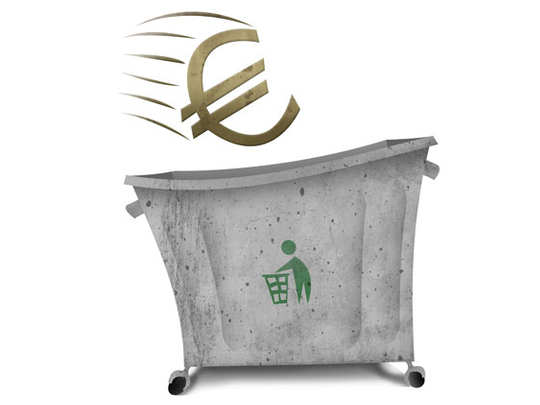
As I read the umpteenth article on the "Grexit", a phrase from the film Marathon Man ran around my head. In this cult-thriller, Laurence Olivier plays a war criminal turned dentist who tortures Dustin Hoffman by drilling through his dental nerves without anaesthetic. As he does so, he asks repeatedly "Is it safe?"
"Is it safe?" is the question European leaders have been asking themselves for months, as they contemplate Greece leaving the Eurozone. Late last year I found myself discussing this very question with a senior European politician. He had noticed that I had written repeatedly that the Eurozone was a flawed construction that was likely to collapse. If that was the case, I was asked, would it not be better to break the whole thing up now?
At this point, I heard myself becoming shifty and evasive — "The trouble," I replied, "is that I keep being told that a break-up would cause a catastrophe. Until I can tell you convincingly why that's untrue, I can't responsibly advocate it."
But prevarication is no longer good enough. In the coming months, Europe may be forced to decide.
So — to answer the question that I dodged back in December — yes, I do think that it would ultimately be better if the Eurozone broke up. This might not involve a complete reversion to national currencies. A hard core of euro-users, centred on Germany, might survive. But the current euro will have to go.
It is true that the transition from here to there will be painful and dangerous. My colleague Martin Wolf laid out an updated version of the full horror scenario in last Friday's Financial Times — involving a breakdown of law and order in Greece, and financial collapse across Europe. How could anyone responsibly run that risk?
Alternatives
The answer is that the alternatives to Eurozone break-up are inherently implausible and deeply unattractive. Last weekend G8 leaders called for Greece to stay in the Eurozone. Their present plan seems to involve some magical mix of stimulus and austerity that restores both budgetary balance and growth. But even if they can agree a real plan and even if it works — and neither outcome is likely — the Eurozone's structural problems would remain.
Without the option of devaluing their currencies, uncompetitive economies are left with "internal devaluation" — otherwise known as wage cuts and mass unemployment. It is true that countries such as Greece badly need economic reforms. But these reforms — conducted within the straitjacket of monetary union with Germany — are causing political and economic turmoil.
The real problem, however, is political. The euro does not have a political union behind it so it simply lacks the key institutions needed to make monetary union work. There is no strong central government to enforce budgetary discipline and no large federal budget to fund transfers from rich to poor areas. And, as we are discovering, there is no euro-wide bank-deposit insurance scheme.
In theory, the Eurozone might rectify this error by moving to a real political union. But the idea of a permanent transfer of sovereignty from Athens to Brussels has been rejected by all sides in Greece. Meanwhile, in Germany, the idea of a transfer union — involving a permanent gush of subsidies from northern to southern Europe — remains anathema.
Even if EU politicians were able to overcome such objections and create a real federal union, this giant new entity would essentially hollow out the powers of national democracies. Sacrificing national self-rule on the altar of the euro is inherently objectionable — and would invite a nationalist backlash across Europe. This "cure" for the ills of the euro would be worse than the disease.
Since the long-term alternatives to the break-up of the Eurozone lack credibility, it is necessary to think about how to manage such an event — rather than simply dismissing it as too dangerous to contemplate.
Firewall
Unfortunately, the break-up plans that Europeans are already drawing up behind closed doors are too limited.
They envisage a Greek exit, followed by a determined effort to throw up a firewall that prevents other countries being sucked into the crisis. This has unfortunate echoes of the past two years, during which the EU has consistently tried and failed to confine the crisis to Greece.
In fact, the exit of Greece would unleash contagion, by making it clear that membership of the euro need not be permanent. Markets would inevitably round on the next vulnerable countries.
Allowing the fate of the euro to be driven by a succession of market panics would be the worst possible way of breaking up the single currency. It would involve the loss of billions of euros of public money as the EU burnt through its firewall. The political and economic turmoil that followed would cause public panic and discredit the politicians in charge.
It would be infinitely preferable if EU leaders were to make a rational assessment of which countries are willing and able to stay in the euro — and announce plans to work on an amicable and orderly divorce between the stayers and the goers. Only by acting in this way might they finally achieve their oft-stated goal of "getting ahead of events". Almost all euro-users adopted the currency without a referendum, and they could leave the same way.
It is true that even a "velvet divorce" for the Eurozone would involve enormous dangers. But at least it would offer a believable exit from the present maze. As a (very) German proverb puts it — "Better an end with horror, than a horror without end."
— Financial Times












